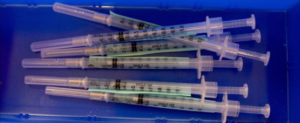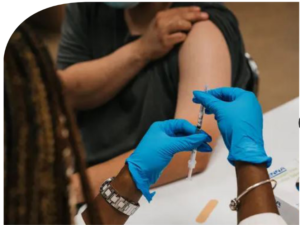
A US Centers for Disease Control and Prevention (CDC) advisory panel is due on Tuesday to recommend whether the updated Covid-19 shots formulated by vaccine manufacturers should be given broadly or just to specific populations at higher risk during this fall’s vaccination campaign.
The updated shots are part of a push by public health officials to align the next Covid vaccines more closely with the actual circulating variant of the virus, similar to the way annual flu shots are designed. The meeting of the CDC advisers was set to start at 10am ET (1400 GMT).
At issue is whether the advisers will call for targeting specific populations for the new boosters – such as older adults or people with underlying medical conditions – or a campaign with the broader population in mind. “I do think that a broad boosting strategy makes sense,” said Caitlin Rivers, a senior scholar at the Johns Hopkins Center for Health Security in Baltimore, adding that while the virus was not causing as many hospitalizations and deaths as before, it is still circulating.

The meeting of the CDC advisers was set to start at 10 a.m. ET (1400 GMT). At issue is whether the advisers will call for targeting specific populations for the new boosters – such as older adults or people with underlying medical conditions – or a campaign with the broader population in mind.
“I do think that a broad boosting strategy makes sense,” said Caitlin Rivers, a senior scholar at the Johns Hopkins Center for Health Security in Baltimore, adding that while the virus was not causing as many hospitalisations and deaths as before, it is still circulating. CDC Director Mandy Cohen will make the final decision sometime after the committee’s vote, and may or may not follow the panel’s advice.
ALSO READ: Around the world in pictures
US CDC to decide who should get the new Covid-19 shots Covid infections and hospitalizations have been rising in the United States, Europe and Asia but remain well below previous peaks. US deaths are now relatively low – reported at around 2,000 last month – though the country has experienced 1.1 million Covid deaths since the outset of the pandemic.
“The one group that I am curious to hear the committee’s recommendation on is young men, because we do see that, in rare cases, young men can develop myocarditis or related effects,” Rivers said, referring to a rare condition in which inflammation develops in the middle muscular layer of the heart wall.
The first Covid vaccines in 2020 were monovalent, or single-target vaccines, aimed at the original strain of the virus. They were followed by bivalent Covid vaccine booster shots that targeted both the original and the Omicron strains. The new updated shots are again monovalent, targeting what is called the XBB.1.5 variant, as requested by the FDA.
“I do think that the XBB.1.5 vaccine will provide better cross protection against the current Omicron variants than the bivalent booster,” said Dr. Daniel Kuritzkes, chief of infectious diseases at Brigham and Women’s Hospital in Boston. Scientists are also closely watching other Omicron subvariants that are circulating, including the currently dominant EG.5, nicknamed Eris, and the highly mutated BA.2.86 subvariant, that had raised concerns about a resurgence of infections.
Kuritzkes said there will be some cross-protection across variants from the updated shots. “It’s obviously not the same as giving a shot of whatever the most prevalent current variant is, but that is almost an impossibility, given the speed with which the virus has been evolving,” Kuritzkes said.
Vaccine makers Pfizer/BioNTech, Moderna and Novavax have said their updated shots are effective in protecting against the EG.5 subvariant, while Moderna and Pfizer’s shots generated strong responses in testing against the BA.2.86 subvariant. Novavax said on Monday it was still testing its vaccine against BA.2.86.
(Reuters)